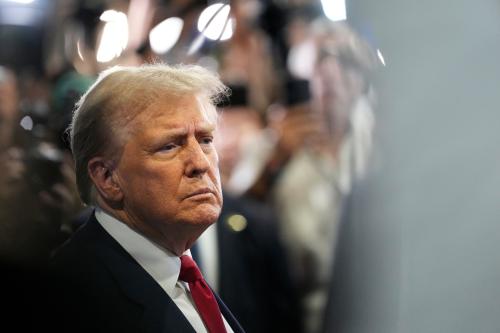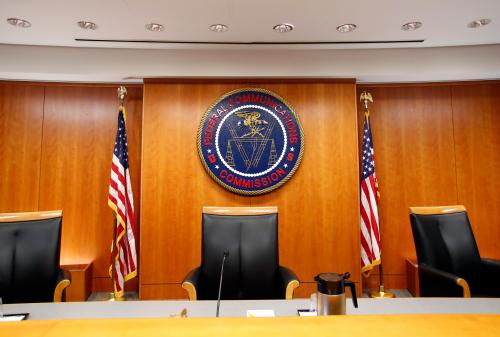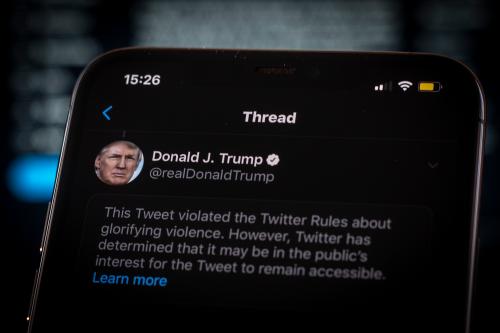“I have the right to do a lot of things that people don’t even know about,” Donald Trump told a reporter in a 2020 Oval Office exchange. One of those powers is his authority to shut down radio, television, both wireless and wired phone networks, and the internet.
An obscure provision tucked at the back of the Communications Act (Sec.706, codified as 47 USC 606) empowers the president to “cause the closing of any station for radio communications” (such as broadcasting or mobile phone networks) as well as “cause the closing of any facility or station for wire communications” (such as telephone and internet networks). All that is necessary for the exercise of these huge powers is a “proclamation by the President” of “national emergency” in the case of broadcast stations and mobile phones, or the “interest of the national security” for the internet or telephone networks. The statute also gives the president the power to suspend or amend FCC regulations.
Such authority makes one tremble when considered alongside Donald Trump’s stated belief, “When somebody’s the President of the United States, the authority is total.” His recent threat to social media platforms to “close them down” continues his efforts to use government authority to coerce and manipulate the media.
Previous threats include a September 2018 tweet targeting the television licenses of a company that displeased him. “I have long criticized NBC and their journalistic standards – worse than even CNN,” he wrote. Then he threatened government action: “Look at their license?” Of course, NBC, the network, does not hold a “license,” but the parent company does own very valuable FCC-granted broadcast television licenses in many major cities. While pulling those licenses never happened, the threat was designed to have a chilling effect on the network’s editorial decisions (there is no proof it did so at NBC).
A few weeks ago, in a carefully orchestrated Oval Office event, the president tried the same kind of intimidation with internet social media networks. When Twitter began posting fact-based content links alongside Trump’s more preposterous tweets, his solution was to bring forth the power of federal agencies. With the attorney general standing beside him, the president issued an Executive Order which, among other things, instructed the FCC to get into the oversight of free speech and determine whether such decisions are made in “good faith.” One of the Trump-appointed FCC commissioners, Brendan Carr, immediately fell in line saying the proposal “makes sense.”
It is not a big step from using the power of the government to threaten free expression to actually doing something to curtail that expression. All it takes is a unilateral “proclamation by the President” of the existence of a “national emergency.”
Such declarations of national emergency have become a go-to solution for this president to get his way. Only days after being sworn in, he restricted travel from majority-Muslim countries for alleged security reasons. As a part of his trade war, Trump imposed tariffs on foreign steel and aluminum, declaring importation a national security threat because of its impact on domestic production. When the Congress wouldn’t give him the funding he wanted for the Mexican border wall, the president simply used a national emergency declaration to reallocate Defense Department funds to build the wall. In his push to help the coal industry, the president even considered declaring that the use of natural gas to power electricity production was a national security risk because the gas pipelines could become terrorist targets.
A report earlier this year by the Congressional Research Service can only heighten concerns. The report concluded, “In the American governmental experience, the exercise of emergency powers has been somewhat dependent on the Chief Executive’s view of the presidential office.” This Chief Executive has explained to us all his view of the presidency: “I have an Article II [of the Constitution], where I have the right to do whatever I want as president.”
These issues take on particular relevance as we enter an election to determine Donald Trump’s future. Whether he would even think twice about using what he regards as his “total authority” as a tool in that campaign is one of the existential threats to this grand experiment called American democracy.
At the heart of every election are the networks that connect us with a free flow of ideas. No president has ever used his power over those networks to influence an election outcome. But, then, no president ever used gas and rubber bullets to clear the way for a campaign photo op.
A 2010 U.S. Senate report on cybersecurity observed, “The Committee understands that Section 706 gives the President the authority to take over wire communications in the United States and, if the President so chooses, shut a network down.” Note the terms “take over” as well as “shut a network down.” To a president who has relied on emergency declarations as a means of getting his way, the opportunity could be enticing.
For instance, after his meeting with Kim Jong-Un, the president triumphantly tweeted, “There is no longer a Nuclear Threat from North Korea” and heaped praise on the dictator. Now, Fox News is warning, “North Korea likely to attack US Presidential Election in November.” Faced with the need for a mid-campaign rehabilitation on his relationship with Kim, a North Korea-driven state of emergency could be an excuse to trigger Section 706.
We have all watched as even before the 2016 election the intelligence community warned that foreign powers used the internet to interfere in the exercise of democracy. Trump ignored these reports fearing they impugned his legitimacy. But what if the 2020 election starts going the wrong way for him? Could Donald Trump suddenly announce new evidence of a foreign infiltration national security threat to trigger Section 706 and shut down or constrain the internet?
And then there is the post-election period. As states across the nation rush to expand remote voting in response to COVID-19, the president told an interviewer that if his campaign does not win lawsuits challenging mail-in ballots, “it puts the election at risk.” Then what? Donald Trump has already tweeted, “There is NO WAY (ZERO!) that Mail-In Ballots will be anything less than substantially fraudulent.” Could he, after the election, declare a national emergency because of “fraudulent” mail-in ballots?
What are we as citizens to do? The courts have thus far been the watchdog when Trump overreaches. But judicial review is a slow process that requires a triggering event. The chances the divided congress would act are infinitesimal, and even then, Trump would have to sign the bill.
Our best defense is vigilance. As we head into the election of 2020, the House of Representatives should hold hearings to shine the spotlight on presidential powers “people don’t even know about,” including Section 706. Of course, an informed and aware public is the first defense against authoritarian abuse. But also, if we have learned anything from COVID-19 it is the importance of anticipating problems and identifying solutions before they happen.
The Brookings Institution is committed to quality, independence, and impact.
We are supported by a diverse array of funders. In line with our values and policies, each Brookings publication represents the sole views of its author(s).








Commentary
Could Donald Trump claim a national security threat to shut down the internet?
June 25, 2020